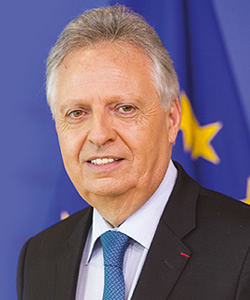Dear readers,
 This year's EU Sustainable Energy Week is taking place after the entry into force of the Paris Agreement and the publication by the European Commission of the Clean Energy for All Europeans package. The clean energy transition is no longer a choice for Europe; it is a responsibility towards all citizens, our future generations and the planet. It has to be driven forward steadily and wisely. At the same time, energy transition also represents a real economic opportunity.
This year's EU Sustainable Energy Week is taking place after the entry into force of the Paris Agreement and the publication by the European Commission of the Clean Energy for All Europeans package. The clean energy transition is no longer a choice for Europe; it is a responsibility towards all citizens, our future generations and the planet. It has to be driven forward steadily and wisely. At the same time, energy transition also represents a real economic opportunity.
The 2017 EU Sustainable Energy Week (EUSEW) taking place in Brussels from June 19 to 25 brings together clean energy pioneers, sustainable energy businesses, academics and research centres as well as civil society: EUSEW is the biggest and most-well known event of its kind in Europe. It represents the ideal place to advance innovative ideas, exchange on best practices and connect clean energy stakeholders to join forces in driving forward the energy transition. During the 3-day Policy Conference (20-22 June), workshops will provide information on the latest policy developments and help to identify remaining obstacles and challenges. On top of that, the Sustainable Energy Awards will be given to the most innovative and promising clean energy projects. I remember how impressed I was by last year's winner, Green Brewery Goess, with its inspiring example of brewing green and sustainable beer with the support of hydropower, biomass district heating and solar thermal energy on its production premises. With their vision of becoming the first major beer brewery to reduce CO2 emissions to nearly zero, Green Brewery Goess shows us that sustainability is increasingly becoming a key priority for businesses all over Europe.
As such, EUSEW takes on a vital role in the realisation of the EU's Energy Union. The most important step in this direction was taken last November when the European Commission published the Clean Energy for All Europeans Package. With the proposals on the table, energy efficiency has been put first, the objective of becoming global leader in renewable energies has been confirmed, and the package is also aimed at providing a fair deal for all European consumers.
The first goal is actually very simple – energy that is not consumed does not pollute and does not need to be imported! Thus, placing energy efficiency first on our agenda will play the most important role in decreasing greenhouse gas emissions. In this context, as part of the Clean Energy package, the Commission is proposing to increase the ambition level for energy efficiency and to have a target of 30% binding at EU level for 2030.
We place particular importance on the buildings sector as it accounts for almost half of Europe’s energy consumption. Significantly speeding up renovation rates of Europe's building stock is an important element in this context. Furthermore, with our proposals, buildings will not be passive objects that consume energy, but will become an active part of our energy system, by producing and storing renewable energy onsite. Smart buildings are also broadly recognised as a major enabler of future smart and renewable-intensive energy grids. Smart buildings can help not only to adapt energy behaviour to the situation of the energy grid, but also maintain or improve the comfort and lifestyle of those that live in them. However, the uptake of smart technologies for buildings needs to be stimulated. This is why our proposal for amending the Energy Performance of Buildings Directive introduces a smart indicator that will reliably quantify the capabilities of buildings in terms of connectivity and intelligence, focusing on three areas: energy optimisation, interaction with building users, and participation in demand-response schemes. This indicator will raise awareness of the added value of smart technologies and will encourage cost-effective investments in smartness, leading to a circle of improvement of the EU building stock.
We are also enabling and empowering consumers to become more active. By encouraging smart metering, consumers will be increasingly equipped to better follow and adapt their energy consumption to the energy market price. It will also become easier for them to participate in the clean energy transition themselves by investing in their own energy production, which can be more easily fed into the grid.
District heating is another perfect example where energy efficiency gains can be garnered in both energy generation and energy use. The EU’s Energy Efficiency Directive currently focuses on the technological and economic aspects: it requires all Member States to analyse how much of their heating needs could be met by district heating. The proposal of the Clean Energy package goes a step further: We now also focus on consumers of district heating by requiring Member States to offer clearer and more frequent information on the energy consumed for heating, especially for multi-apartment buildings.
Finally, energy transmission and distribution networks can become more energy efficient by reducing electricity losses, gas leaks and compression losses and by adapting to a growing share of renewable energy generation. An upgraded electricity grid will help to minimize curtailment, harmonise divergent generation and consumption patterns, improve stability and security, and promote cross border balancing.
The Commission will not be able to do all this alone, but we will need engagement from all parts of society. And to do this, we need to raise awareness of the challenges and opportunities ahead. This is why I am looking forward to many great sustainable energy projects and ideas, presented at the EUSEW 2017! Meanwhile, I invite you to discover the EUSEW at: http://eusew.eu/